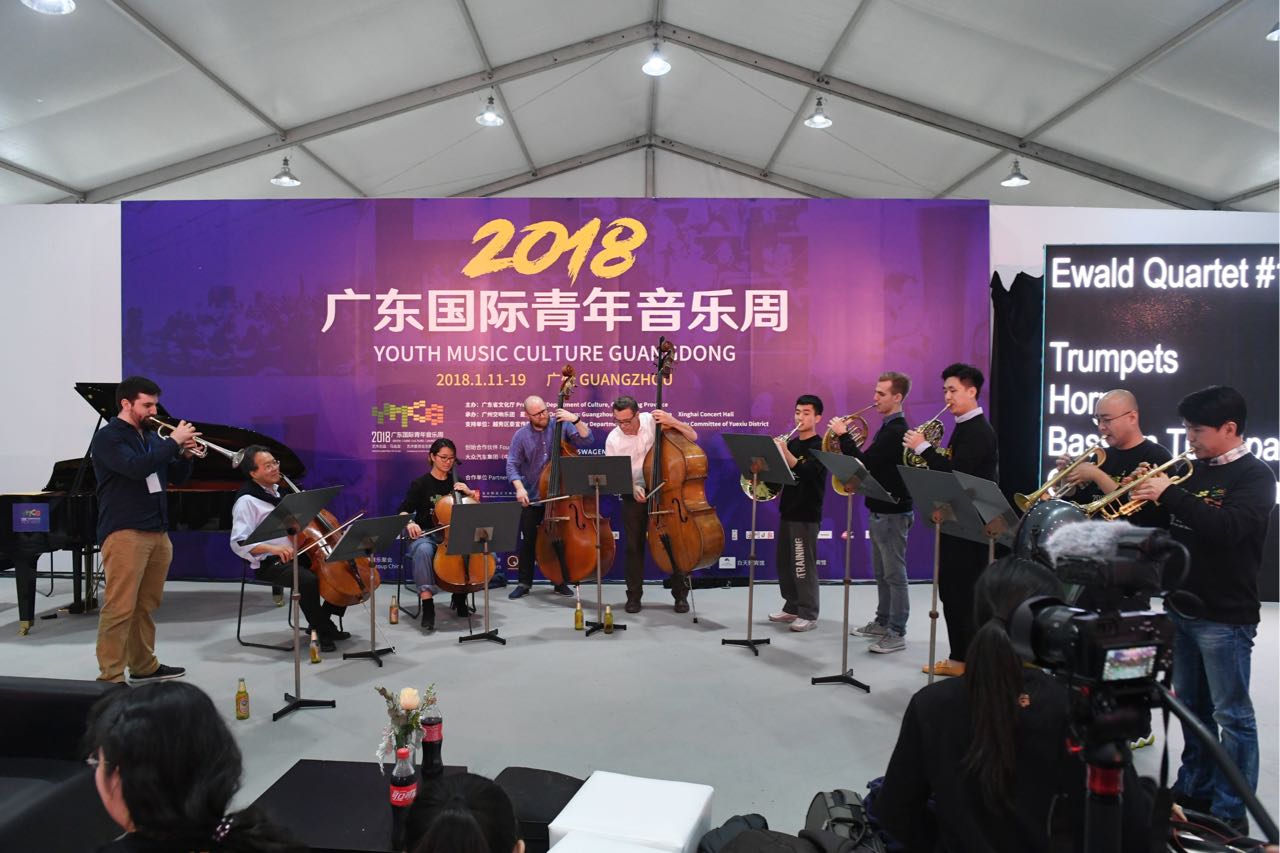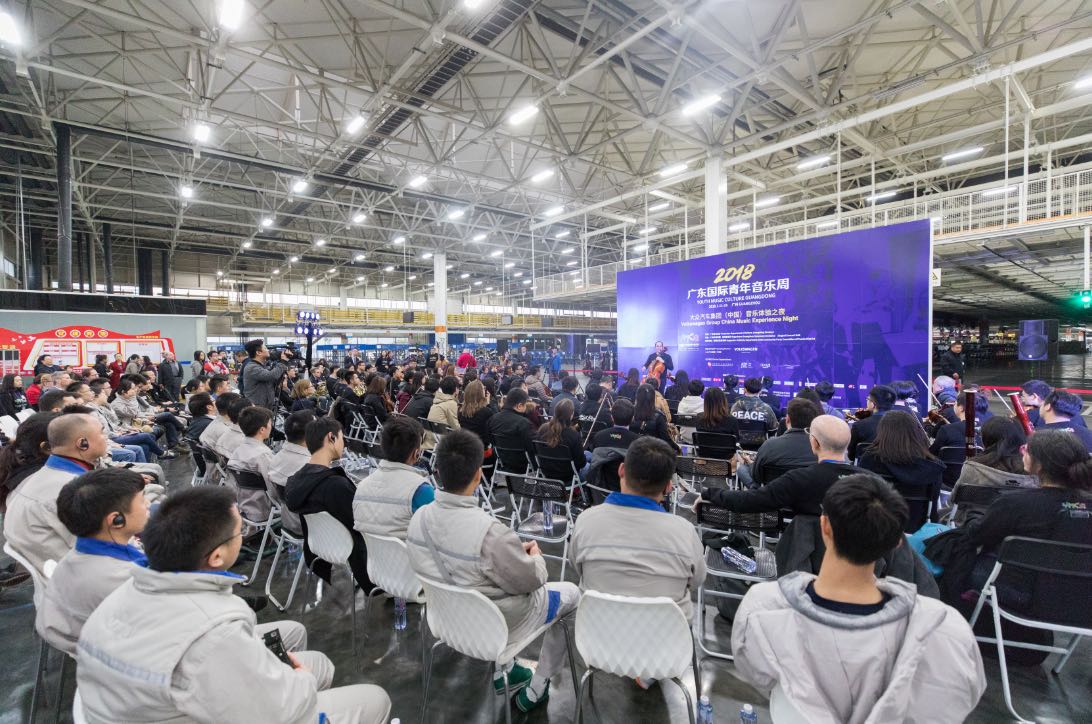Presented by the Guangdong Provincial Department of Culture, organized jointly by the Guangzhou Symphony Orchestra (GSO) and Xinghai Concert Hall, the 2018 Youth Music Culture Guangdong (YMCG) drew to a close on January 19 in Guangzhou.
Under the guidance of the Maestro Long Yu, Chairman of the YMCG Artistic Committee and renowned Music Director of the Guangzhou Symphony Orchestra, the second annual YMCG invited 15 top artists and scholars to join the faculty. With YMCG Artistic Director Yo-Yo Ma at the helm for a second year, faculty members collaborated with young musicians hailing from four different continents and diverse backgrounds in establishing a new YMCG Symphony Orchestra. YMCG Founding Partner from 2017, Volkswagen Group China’s AEP-China, continues to support this year’s project.
In the span of nine days, the YMCG faculty led by Yo-Yo Ma conducted chamber music masterclasses, coachings, Silkroad improvisation workshops and rehearsals for Beethoven’s Symphony No.3 (“Eroica”) with young musicians. In total, more than 200 sessions were held during the period. In addition, there were concerts, seminars, two Volkswagen Group China Music Experience Nights, “Music + Dialogue” forums, open rehearsals and a “Musical Marathon,” enabling young musicians and the general public to learn more about the classical repertory, musical languages and creative inspirations. During the process, they explored Ludwig van Beethoven’s life and works and their relevance to us today.
An all-new experience: A nine-hour “Musical Marathon” featuring 30 works
At the closing concert on January 19, all participants of the 2018 YMCG performed from 1:30 p.m. to 9 p.m. in a veritable “Musical Marathon.” Subtitled “From Beethoven to the Unexpected,” they shared what they’ve learned from each other during the previous nine days.
The young musicians were divided into 16 chamber groups and 11 improvisation “bands” performing a total of 27 works. Yo-Yo Ma and faculty members also took part in performing chamber works, as well as playing in the 2018 YMCG Symphony Orchestra in Beethoven’s Symphony No.3 (“Eroica”) under the baton of Michael Stern. In total, including the encore piece that was an orchestra improvisation, the “Musical Marathon” featured 30 works.
This marathon, without a doubt, is a huge challenge for the young musicians. Nevertheless, Yo-Yo Ma believes that they have such inherent courage. “The music we make reflects Guangzhou of today as well as its history,” says Ma. “This city not only has a thriving economy but also nurtures innovation. Music brings people courage and hope. Here, the people and the musicians all have courage.” Ma is delighted that Guangzhou engenders such a “safe” environment for musical creativity, providing the space to organize such a bold experiment as a “musical marathon.” In this setting, there is no so-called hierarchy separating faculty, fellows and YMCG musicians: they all learn from each other.
Members of the 2018 YMCG comprise less than 20 percent returnees from the inaugural year. This year’s participants include not only young musicians of Chinese descent, but also those from other countries. Apart from the 15 international artists who comprise the faculty, six members of the Civic Orchestra of Chicago joined YMCG as fellows, assisting coachings and performances. In fact, Yo-Yo Ma, the string faculty and fellows joined the open rehearsal of Beethoven’s “Eroica” on January 18 and the performance the following evening. Through their teaching and actions, they inspire imagination and creativity, letting young musicians from around the world experience how music can be created “with” and “without” a written score as they equip themselves to rise from mere performers to true artists.
At the YMCG workshops and rehearsals, Beethoven and his music were the main focus. At an early rehearsal of Beethoven’s “Eroica,” violinist Pamela Frank suggested adding a hand drum as a “human metronome,” helping the entire orchestra to feel the music’s tremendous rhythmic tension. Prior to that rehearsal, faculty members had formed their own special “quintet” experimenting with Beethoven’s “Eroica” with a hand drum, after which they decided to try it out at the orchestral rehearsal. Members of this innovative “quintet” were Yo-Yo Ma (cello), Pamela Frank (violin), Hsin-Yun Huang (viola), Anna Polonsky (piano) and Joseph Gramley (hand drum).
When they rehearsed this special arrangement in the YMCG Music Tent, young musicians around them could feel the driving pulse and how these great artists were able to sustain tension even at such a reduced instrumentation. This, according to Ma, is “the essence of Beethoven.” For those YMCG musicians who heard this alternative version of “Eroica,” their experience of the work would forever be transformed.
Creativity that fuses East and West: Musical innovation bearing witness to cultural confidence
What is the goal of YMCG? Yo-Yo Ma clearly defines it: “Meaningful communication; trust between the self and the collective; co-operation of individuals.” “Connecting cultures” is a fundamental principle of YMCG. It is also Yo-Yo Ma’s belief. We must listen, exchange ideas, compromise, merge our interests, and co-operate to reach our concerted goal. This is a win-win situation in which everyone puts their foot forward.

Yo-Yo Ma once said, “When playing music, you must remember its origins.” When we “cherish our cultural roots, draw on other cultures, and be forward-thinking,” we promote the creative transformation and innovative quality that distinguish Chinese traditional culture. On this front, 2018 YMCG faculty member Wu Man—a pipa virtuoso who is a member of the Silkroad Ensemble—has set a great example. Her performance on Jan 11 (YMCG Opening Concert) of Lou Harrison’s Concerto for Pipa and Strings bore testament to the maxims above. The Silk Road is a cultural icon of China of an open and tolerant environment. It is the symbol of exchange of ideas, melding of influences and mutual benefit. The pipa is an instrument imported into China along the Silk Road. Today, it has become one of the most recognizably Chinese traditional instruments.
At the Foshan branch of FAW-Volkswagen, YMCG faculty members Hanneke Cassel, Mario Gotoh and Mike Block demonstrated how to make a Beethoven classic their “own.” Joseph Gramley and Wu Man exemplified cultural exchange in showing the importance of listening by way of interactions between small cymbals and a pipa. Finally, Silkroad Ensemble faculty members performed an improvisation traversing time and space, creating music that connected the world.
The YMCG is a place where young musicians not only advance their technical prowess, but also develop individuality and creativity. The project motivates young musicians as they strengthen their confidence in their own culture, in turn fostering the long-term development of Chinese music. Just as Yo-Yo Ma stated, “Tradition is something precious kept in your family. Not only do we have to treasure it, but we have the pass it onto the next generations. But music is different from artefacts. It’s an intangible cultural heritage that must continually develop and enrich itself. Not only do we treasure it with our hearts, but we must also give it new life, sharing it with friends and neighbors, so they can learn about and appreciate it.”
Serving the community, benefitting the people, radiating music’s “human expression”
The 2018 YMCG was not only presented and sponsored by the Guangzhou Provincial Government, but it also received sponsorship from Volkswagen Group China as well as the Guangzhou Symphony Orchestra Art Development Fund, enabling the project to reach a scale larger than its inaugural year. In addition, although such world-renowned artists as Yo-Yo Ma appeared on stage at the Opening and Closing concerts, we continued to offer low-priced tickets as our gesture to the community. For example, all tickets for the Opening Concert on January 11 were priced at RMB100. For the Closing Concert (“Musical Marathon”), ticket prices ranged from RMB120 to RMB180. Such low ticket prices have been greatly welcomed by the public. For the Opening Concert, we even opened the Xinghai Concert Hall choir stalls filled to capacity with enthusiastic music lovers. The YMCG Closing Concert, in a format of a two-part “Musical Marathon,” was also sold out.
The 2018 YMCG’s main focus was Ludwig van Beethoven. Just as Maestro Michael Stern said, “Beethoven was a pioneer in music history; nobody who followed him could match him in stature.” Not only that, but how he lived his life and conducted himself in society really brought classical music into a new realm of endless possibilities. Beethoven continued to inspire us today. The public attended free “Music + Dialogue” sessions touching on such topics as “Fit as a Fiddle: Playing Healthy,” “Variations on a Theme: A Workshop on Improvisation,” “Hope and Heart: Why Beethoven Still Matters—Reflections from 2018 YMCG” as well as open rehearsals. They came into close contact with brilliant artistic minds.
The 2018 YMCG was widely acclaimed by faculty and young musicians alike. Although this was her first time participating as YMCG faculty, violist Hsin-Yun Huang was moved by the Silkroad workshops and the students alike. “In doing anything, you must set out principles first and foremost. Every decision in YMCG is a collaborative effort: we all participated and we made decisions as a group. This is really a large family. Through music, we could search for the questions for the future, building a bridge to connect with the future.”
This year’s YMCG included two percussionists travelling from afar: percussionists Gip Chan from Hong Kong and Wang Kang from Taiwan. Their view of YMCG is representative of young musicians throughout the nine-day period. To them, YMCG is a daring challenge for recent conservatory graduates.
At the same time, this is a true breakthrough in experimental music education. “When we first started, we really didn’t know what to do, but all this inspired us to ponder many things. From the first day, Yo-Yo Ma asked us, ‘Why do you study music? What can music do for the future?’” After days of rehearsal and exchange of ideas, they began to understand how music could be presented in many different ways, breaking free of formulas or pre-existing rules. They learned from YMCG that music can be interpreted in many different ways and along many different paths, but one must have an open-mind and boundless imagination to bring that to fruition. That is the difference between an average musician and true artist. Perhaps one day they can utilize the knowledge and skills acquired from YMCG, completing that path, transforming themselves from musician to artist!



